UIT has promoted an estimated 45 interns to full-time staff since 2012

Mitch West, left, and Doug Kenner laugh while eating lunch during the 2019 UIT holiday luncheon and prize drawing.
Pat Tobin hadn’t written a single line of code when he transferred to the University of Utah in 2015 for a bachelor’s degree in information systems — a “brutal realization” for someone pursuing an IT career. Then he joined University Information Technology’s (UIT) student employee program.
Soon after, he was writing automation programs to test the functionality of websites for the Quality Assurance team in University Support Services (USS).
Within two years, Tobin accepted a benefitted full-time position as a software design engineer for the USS HR/Auxiliary Engineering Team. He later became a systems administrator for Software Platform Services (now Platform Services) in the Chief Technology Officer (CTO) organization.
Tobin is among 366 U of U students who have worked for UIT's internship program since it was established in December 2012, according to data from PeopleSoft. The program comprises Student University Development Opportunity (SUDO) and USS internship programs.
In the past decade, UIT has hired an estimated 45 of those students (about 12 percent) into full-time positions. Twenty-eight — about 8 percent of UIT's current full-time cohort — still worked for the organization as of late August. More than 75 students work as UIT interns right now.
The promotion of interns to full-time positions is a huge success for the program that has provided U students a steppingstone to entry-level positions at well-known private-sector tech companies, including Adobe, Goldman Sachs, Premier, and Raytheon. Although they could go elsewhere, student employees want to work full time for UIT because it offers unique benefits, from a great workplace culture to a commitment to current and ongoing education.
“UIT’s culture is fantastic. There's a lot of camaraderie among various groups and people in our department and across the university. … Everybody's super nice and supportive,” Tobin said. “UIT also provides a lot of resources, which makes for a low-stress, high feeling of accomplishment workplace.”
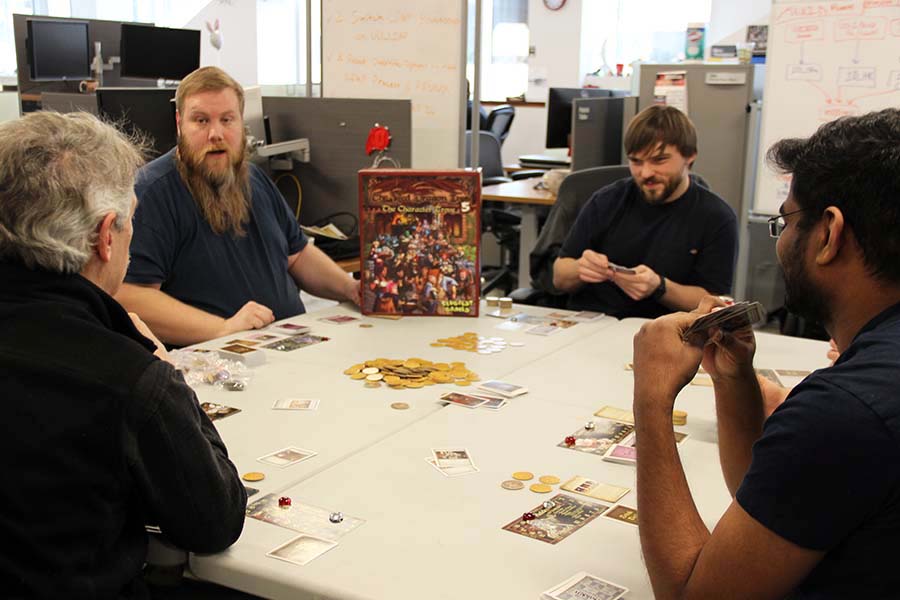
USS staff members play the Red Dragon Inn card game.
Valuable opportunity
Mitch West, a U computer science graduate, applied for a UIT internship because it provided hands-on work experience and a flexible, part-time schedule.
“It was a no-brainer ... I was working a part-time job I enjoyed as a barista. But I felt like I couldn’t pass up something that was in my field of study,” said West, who joined UIT in 2013 as a student software engineer focusing on PeopleSoft programming for the USS Student Team.
McKenzie Spehar also felt that a student job with UIT would be a good opportunity while she finished her degree.
Although she was majoring in writing and rhetoric studies, Spehar had an interest in technology and data. In 2017, she joined the USS Business Intelligence team (now called Data Management & Analytics or DMA) to help with documentation and website management. She later transferred to the SUDO program to become a student lead, a position in which she oversaw interns for several UIT teams; interviewed, hired, and onboarded and offboarded student staff; and scheduled and facilitated resyncs between students and mentors.
“I wish my university had offered a student employee program like ours when I was in school. I would have taken a job there even if it didn't pay (back then a lot of internships didn’t pay) because it is such a valuable opportunity,” said Kim Tanner, director for Software Platform Services in the CTO organization.
The U's Career & Professional Development Center believes so, too. In April, it named UIT employer of the year for employing so many students and providing a high-quality experience.
Tanner and Doug Kenner, associate director for the USS HR/Auxiliary Engineering Team that includes the GIS and CRM teams, said students want to work for UIT because the organization prioritizes their education while offering work experience that prepares them for professional careers. She typically employs four to five students each semester, while Kenner usually mentors two per semester.
“The skills and knowledge they gain here match up well with their academic studies,” Kenner said. “And between the two, students are better prepared to take on full-time positions after graduation.”
With so much flexibility, some interns take on a full-time role even before they graduate.
In 2014, West began working full time as a software engineer for the USS HR/Auxiliary Engineering Team while finishing his undergraduate degree.
“I hadn’t necessarily considered working full time while in school, but the opportunity presented itself. … The ability to leave work to go to classes made the decision a lot easier,” he said.
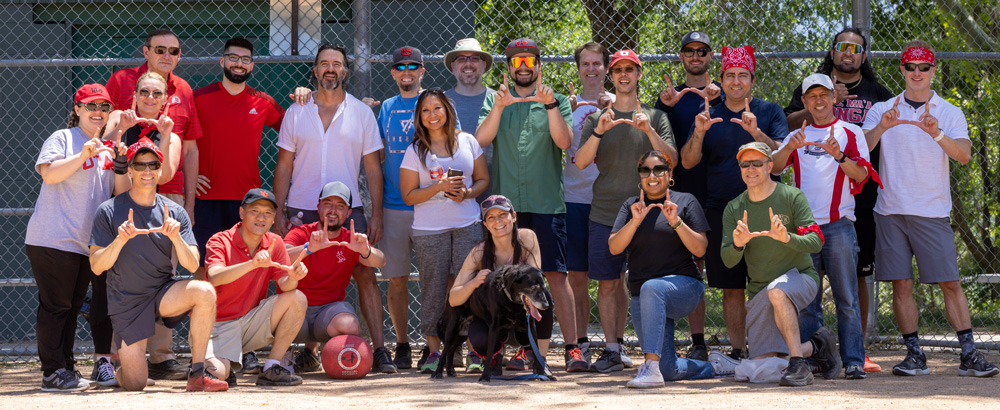
Employees from Software Platform Services (SPS), University Support Services (USS), Student University Development Opportunity (SUDO), and a couple of other UIT teams pose for a photo at the USS-SPS kickball game on June 23, 2022. (Photo by Thanh Nguyen)
Incomparable colleagues and culture
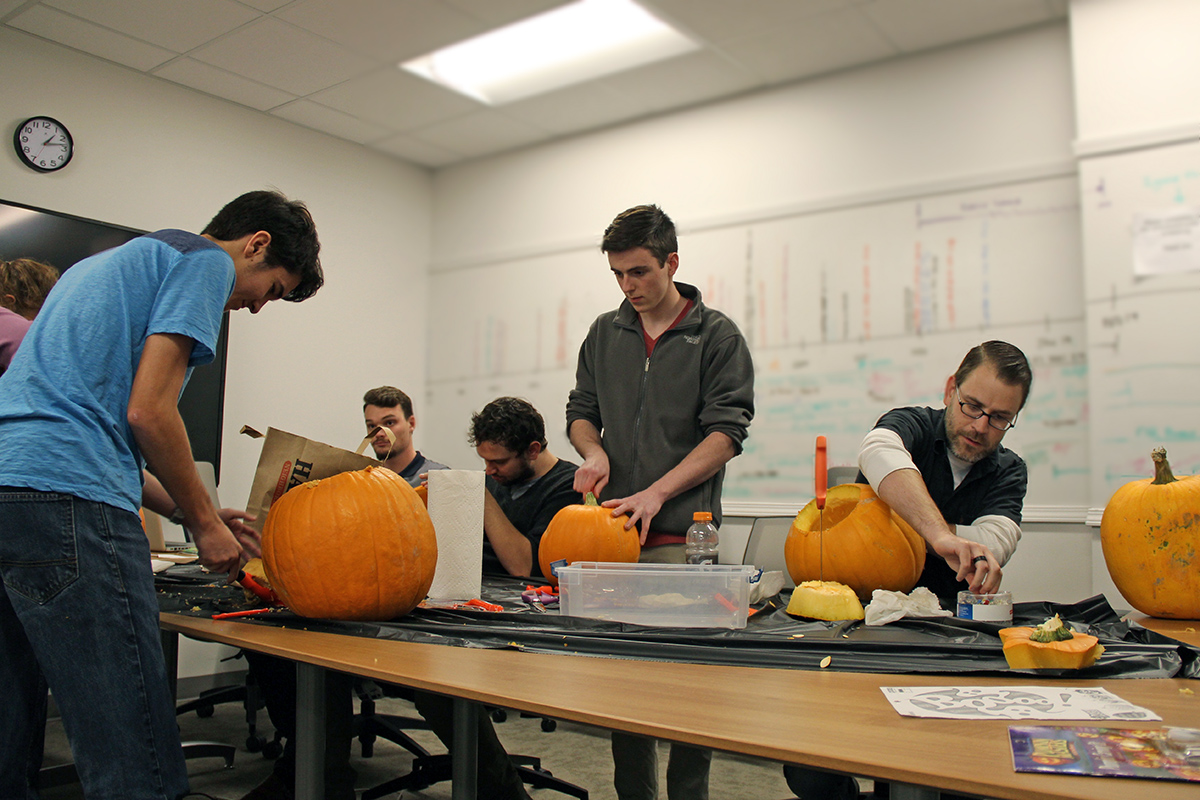
USS pumpkin carving contest.
The former interns and their managers cited several reasons why UIT student employees apply for and accept full-time positions in the campus IT department. Among them: incomparable colleagues and workplace culture, excellent university benefits (e.g., health care, paid time off, and tuition reduction), a commitment to education, stability, work-life balance, and the mission and values of UIT and the university.
At the top of everyone’s list: colleagues and culture.
Tobin applied for a full-time position in 2017 on the HR Team under Kenner because he liked his co-workers and enjoyed going to work every day. He also felt he could learn more from his colleagues.
Spehar became a full-time UIT employee in 2020, joining the Campus Help Desk. Monty Kaufusi, manager for the SUDO program and the CTO Service Monitoring Group, had encouraged her to apply.
“I've had such overwhelmingly positive experiences and interactions with people in UIT and other places across campus. And I've grown so much in my time here … I didn’t want to leave,” said Spehar, who transferred in May to the Governance, Risk, & Compliance team in the Information Security Office (ISO).
She credits former DMA Director Tom Howa, Kaufusi, and Tanner, among others, for providing advice and guidance, answering questions, challenging her, and believing in her.
“I don't think I would have had support and opportunities like that outside of UIT,” Spehar said.
West agreed, saying his co-workers and supervisors make all the difference.
“My experience has been that management empowers us to build things right, make the right decisions, provide input, and all the things that make somebody feel valued in their job,” he said.
He also finds the work rewarding. West said UIT efforts have a big impact on the university and its community members, even though users may not notice them.
“A lot of the stuff we’re building, we’re interacting directly with the people who will use our software, the things we write. We know exactly why we’re doing it and what it’s going to enhance in their day-to-day life,” West said. “We could write something that might save somebody hundreds of hours of work. Or we might make a small change that could vastly improve someone’s work or educational experience.”
UIT, he noted, also serves a higher purpose: to support the university in its mission to foster student success; generate and share new knowledge; and promote education, health, and quality of life.
Commitment to education
UIT and its leaders also invest in ongoing education, whether that’s working toward IT certifications or enrolling in university courses. If UIT teams have the budget, they often pay for employee certifications, such as ITIL 4 Foundation. The university also offers access to Udemy for Business at no cost for staff in an IT role, and tuition reduction for eligible employees and their spouses and children.
Spehar and Tobin have ITIL certifications. Tobin also is a Red Hat Certified Systems Administrator. Tanner paid for the exam from her budget, which “lit a fire” under Tobin to study hard and do well.
“That was a challenging exam. Training for and taking that exam was exciting, though, because it was directly related to my work and it made me a much better systems administrator.”
Tobin and the others also noted that UIT supports full-time employees who want to continue their academic studies. For example, Spehar said she’s considering a Master of Science in cybersecurity management from the David Eccles School of Business, a new degree that’s applicable to her work with the GRC team.
“Trevor [Long, associate director for GRC,] and the rest of my team are supportive and encouraging of continuing education and other learning opportunities,” she said. “I think that'll make it a lot more feasible to get a master's degree and work at the same time.”
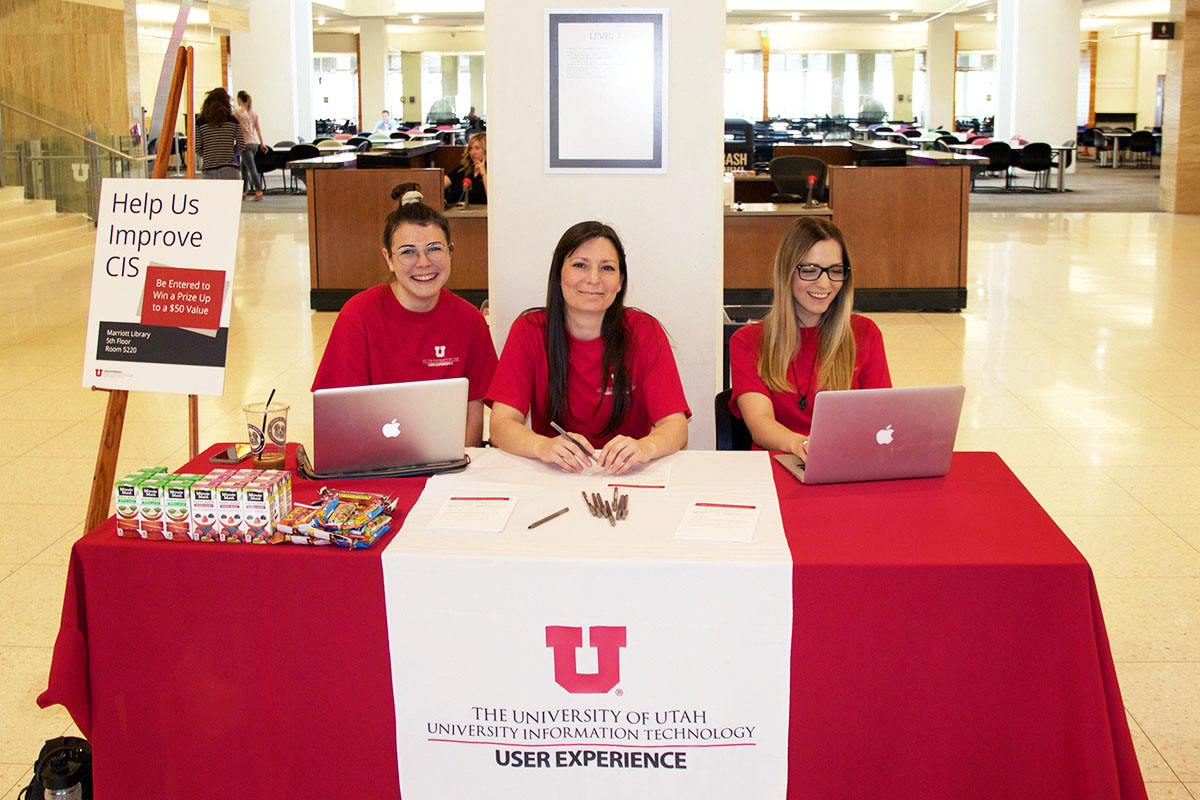
USS staff, from left: Madeline Luke, student intern, Barb Iannucci, associate director of Content Management & Usability, and Alijana Kahriman, administrative officer.
Benefits abound
West is among eight or so former UIT student employees Kenner’s hired for full-time positions, while Tobin was among several former students Tanner has hired. Kenner and Tanner said UIT’s internship program prepares students for more advanced work in the university’s IT environment and provides hiring managers an opportunity to assess whether students might make good candidates for a full-time position.
“You're able to evaluate interns, test their capabilities … and identify high performers,” Tanner said. “So, when I have an opening, I encourage strong candidates to apply because they know the organization, have the experience, and can contribute to our team and projects right away.”
Tanner said it’s also more cost-effective to hire student employees for full-time positions since they already receive mentoring and training specific to university IT systems, processes, and regulations. Not to mention that hiring managers spend less time on the onboarding process.
Kenner added that the program helps offset the challenge of recruiting IT professionals in such a hot tech market.
“The internship program allows us to hire high-caliber individuals who like working here and are much more likely stay here,” Kenner said. “If we didn't have the student employee program, I think we would struggle to find high-quality full-time staff.”
By hiring students into full-time positions, Tanner said UIT supports U graduates and brings them into the professional workforce and industry. Kenner agreed, saying that UIT is a good place for students to get their feet wet in an enterprise IT environment.
Tobin is a prime example of a student employee who found value in a benefitted position with UIT after graduation. He continued to learn new skill sets, methodologies, and technologies while figuring out the next step in his career.
Although he’s since moved on from the university, Tobin said his experience as a student and full-time UIT employee has been rewarding.
“There’s a reason why a lot of people stay with UIT their entire career,” he said.
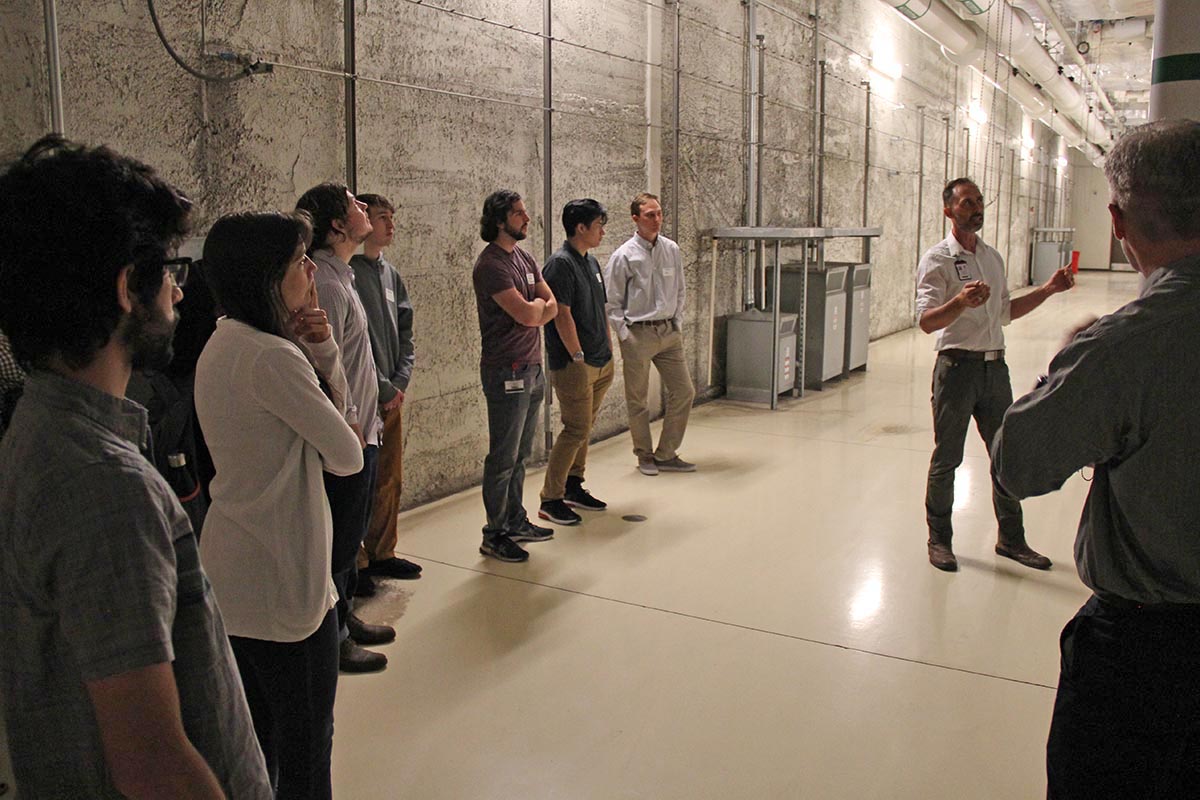 Summit centers on student program growth
Summit centers on student program growth
Since it was established, UIT's student employee program has grown from just over a dozen student employees to more than 75 today. The summit, held at the Downtown Data Center, focused on the state of the program, challenges, and student feedback.
Node 4
Our monthly newsletter includes news from UIT and other campus/ University of Utah Health IT organizations, features about UIT employees, IT governance news, and various announcements and updates.
